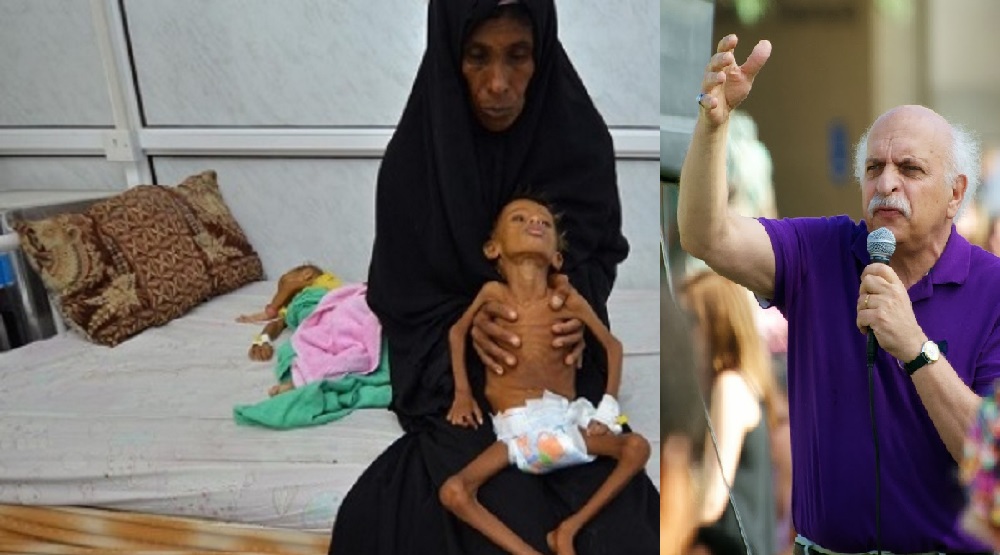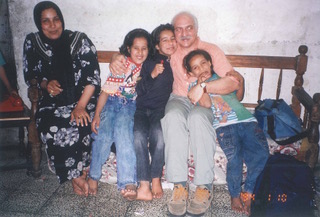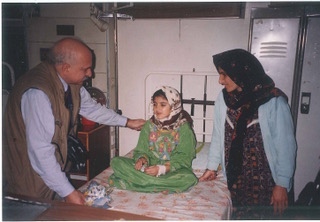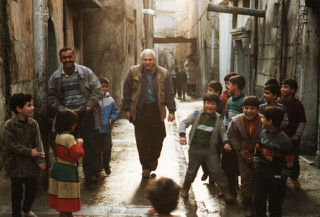American mainstream partner of crimes against the Yemenis

George Capaccio is a writer and activist living in Arlington, MA. During the
years of US- and UK-enforced sanctions against Iraq, he traveled there numerous
times, bringing in banned items, befriending families in Baghdad, and deepening
his understanding of how the sanctions were impacting civilians.
Basirat: How much of the American people are aware of the dimensions of the
Yemeni war?
I don’t really know how many Americans are aware of the dimensions of the war in
Yemen. For that matter, I don’t know how many Americans are even aware of the
fact that the US is deeply involved with this war.
Local news reporters on TV channels pay almost no attention to this war or to
international affairs in general. However, there is coverage by the main news
outlets like CBS, BBC, NBC, CNN, and so on. It would be interesting for someone
to watch reports on these news networks to find out if journalists are reporting
on the statistics provided by organizations like Save the Children or
UNICEF—statistics that show the number of deaths from bombing and economic war,
the number of cholera cases, the number of displaced families, etc.
Also, are these networks reporting on US complicity in the ongoing massacre of
Yemeni civilians? I seriously doubt that American media giants are inclined to
refer to the US government as partly responsible for the terrible tragedy
unfolding in Yemen.
I do think that many local and national peace and justice organizations are
taking on the war in Yemen and doing what they can to push Congress to end US
support for the war. This week the US Senate voted 63-37 to move Senator Bernie
Sanders’ bill, S. J. Resolution 54 to a full debate next week in the Senate.
Two weeks ago, the US House of Representatives almost passed a similar bill.
Peace advocates hope that in the New Year, when the US is once again under
Democratic control, the House will try again to get the bill passed.
Basirat: Do you think the increase in people's awareness has an effect on
this war? What matters to them at all in a country like Yemen?
Yes, I think an increase in awareness is absolutely crucial to the peace
movement in this country and to ending US support for the war. Those of us
working toward this goal (and toward the larger goal of ending the US "war on
terror”) feel that educating people is a first step toward reaching our goals.
A growing awareness of the suffering of the Yemeni people, I believe, has given
politicians like Bernie Sanders a foundation to stand on, as he reaches out to
his colleagues—both Democratic and Republican—and urges them to move forward on
the bill he has introduced in the Senate.
The second part of this question is harder to address. I think only a small
percentage of my fellow Americans truly cares about what is happening in Yemen
or in places like Yemen. Does the death by starvation of nearly one hundred
thousand children in Yemen matter to them? I hope so. On the other hand, I
suspect that what happens in Yemen or Syria, Iraq or Afghanistan is simply off
most people’s "radar.” It’s not that they are necessarily callous or
indifferent. They are likely to focus more on their own issues, particularly at
a time when it seems there is much insecurity in this country. Healthcare costs
are rising; housing is expensive in the larger cities; good jobs can be hard to
find.
In addition, the media too often fails to provide enough context for people to
really understand what’s going on in Yemen and how US support for Saudi Arabia
and its coalition partners is contributing to the suffering of the people.
Mainstream journalists may highlight the death toll from the latest Saudi
bombing or mention the growing cholera epidemic, but what is left out of the
picture is the "hidden hand,” that is, the direct and indirect support we
provide for the Saudis and how this support enables them to blockade Yemen’s
harbors and continue bombing civilian targets.
Basirat: What is the economic war on the Yemeni people and what role does the
US play in it?
In my recent essay on the war in Yemen, I referred to a report by Martha Mundy,
Professor Emeritus of Anthropology at the London School of Economics. In her
report, she argues that economic war is the leading cause of starvation in
Yemen. First, the Saudi coalition attacked military and governmental targets.
The next stage in the war, she says, was the attack on civilian infrastructure.
The third stage is economic war in which harbors are blockaded, commercial
flights out of the country are prevented, and financial transactions are
controlled by the government of Abd-Rabbu Mansour Hadi, supported by forces of
the United Arab Emirates in Aden. In the words of Professor Mundy:
Most importantly, the central bank of Yemen was moved to Aden. This rendered
money transfers to Yemeni banks more difficult, put the issuance of the Yemeni
riyal in the hand of the Hadi government, and made it possible to cease paying
the salaries of all government employees in areas under the control of Sanaʾ
[which Houthi forces control]. The government was the largest employer in the
country, and the jobs concerned extend from medical staff to military personnel,
from teachers to administrators; pension and other social payments were also
halted.
As for the US role in the economic war, Professor Mundy points out that past and
present US ambassadors to Yemen have supported the transfer of the central bank
to Aden and the attack on the port of Al-Hodeidah.
Basirat: How do you think the personal interests of American politicians have
an effect on the support of killing in Yemen?
US defense contractors/weapons makers have a strong interest in making sure the
war continues. After all, it’s good for business. If you happen to be a
politician in a state heavily dependent on the manufacture and sale of weapons,
you’re not likely to vote to end the war, any war for that matter. Those
companies making the weapons are likely to make sizeable contributions to the
campaign funds of certain politicians, and those politicians in turn are not
going to "bite the hand that feeds you.” On the contrary, they will support the
war since political campaigns are so expensive in this country and they need all
the money they can get in order to keep running for office. Only principled
politicians are likely to stand up to defense contractors and work to end the
violence.
Basirat: The Yemeni war began during the Democrats with their support and
continued during the Republicans. What is your opinion about the behavior of
these two parties in this case?
I see no real difference in this case. Contrary to the widespread perception
that Barack Obama was some kind of peacemaker, I hold him just as accountable to
the suffering in Yemen as his successor Donald Trump. Under Obama, the US
authorized logistical and intelligence support to the Gulf Cooperation Council (GCC)
and its launching of military operations in Yemen.
Moreover, the Obama Administration provided in-air refueling, targeting
information, search-and-rescue operations for Saudi pilots, and a major increase
in the exporting of weapons.
The executive branch [since 2009] has notified Congress of proposed foreign
military sales to Saudi Arabia of major defense articles and services with a
potential aggregate value of nearly $139 billion. The United States and Saudi
Arabia concluded arms sale agreements worth more than $65 billion, from FY2009
through FY2016.
Basirat: Is Saudi Arabia so financially beneficial to the United States that
the United States closes its eyes on all these crimes and killings, or is it
something else?
The short answer is yes. The US is the largest exporter of arms in the world,
and Saudi Arabia is a major buyer of the weapons we export. Despite that
country’s abominable human rights record and its war on Yemen, the US, under
Obama, agreed to sell close to 90.4 billion dollars in weapons to the Kingdom
beginning in 2010.
Is our alliance with Saudi Arabia about something more than money? Yes, the
"something more” is oil. Despite the promising boom in shale oil production in
North and South America, the US still imports much of its oil from Saudi Arabia,
which is the largest oil producing member of the Organization of Petroleum
Exporting Countries (OPEC), which controls around 40 percent of global oil
resources.
Basirat: What is your assessment of the outcome of this unequal and inhumane
war?
I am beginning to feel hopeful. Both the House and the Senate are considering or
will consider bills that will end US involvement, which will seriously cripple
the Saudi war effort. Also, there is a growing movement among peace advocates to
educate the public about the war and to increase public opposition in the form
of demonstrations, marches, rallies, vigils, letter-writing, etc.



















